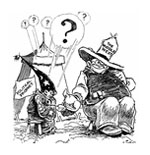
America’s Two Favorite Pastimes
GUEST COLUMN
Please forgive my half-baked ramblings, my questions without answers, these few provocations. I am simply trying to make some sense of what at times seems to be an increasingly senseless world.
Are we headed toward nuclear catastrophe? Are we living in the end times? Is Armageddon nigh?
I was born in 1986. I am, therefore, a child of the “End of History,” not of the Cold War. Of Bush, Clinton, Bush, Clinton. Of rapidly accelerating technological progress, resulting in human progress (no?), moral progress, and the end of wars and conflict between nations. My generation went from floppy disks to compact discs to flash drives to cloud storage to…the singularity?
But is the singularity, when artificial intelligence will surpass human knowledge, just another name for nuclear catastrophe?
In the midst of the end of history, I witnessed 9/11. Well, not witnessed. I was about as far from Manhattan as could be, so to speak, living in Maddock, North Dakota, that metropolitan hub of 500 Swedes, Norwegians, and Germans — farmers or former farmers all. The Twin Towers fell? What were the Twin Towers again? The farthest I’d ever gone from home was to South Bend, Indiana, to drop off my sister at college. New York wasn’t just another city in another state, it was another galaxy.
You May Also Enjoy
A problem arises when someone unfamiliar with Catholic history composes a study of eminent Catholics who lived under persecution.
When the Mass was translated into English, I noticed right away how often it says “Peace”: it’s repeated over and over again, like a heartbeat, clear through.
The mental-health professions in recent years have changed their opinion of religion and now regard faith as a reliable predictor of well-being.

